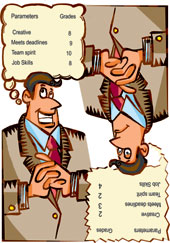 |
When was the last time you had to undergo a performance appraisal? For most, it is never a particularly pleasant experience. You see yourself as the yuppie who should be scoring excellently on all parameters. But then you discover that your boss has a very different idea. The fact that your increment and promotion depend on the appraisal is often secondary. It’s the beating your self-image takes that matters much more.
Believe it or not, person appraisals are often disliked just as much by the persons doing them. No matter what you do, you will leave several people unhappy. You are making comparisons. This means that every time you rate a person worse than his colleague, he has something to hold against you.
There is a growing body of opinion against some of the current appraisal systems. “Even if you are good at your job, you can be rated very poorly,” says Mumbai-based HR consultant Shashi Rao.
Writing in the Harvard Business Review, Baker Foundation professor James Heskett says: “If we assume that the basic purpose of employee evaluation is to build better-performing organisations, then this (performance appraisal) has to be one of the most important things we do as managers.” Yet, how valid is ranking or rating employees in different categories? “The famous GE system involved managers categorising their direct reports into three categories on a ‘vitality curve’: the top 20 per cent, the ‘vital’ 70 per cent, and the bottom 10 per cent.” The last was destined for the boot.
Is this always fair? You can see a parallel in the relative grading that is followed at some engineering and B-schools. Under this, you can score an absolute 90 per cent in some paper, but come in the last 10 per cent (and “fail”) because everyone else has scored 95 per cent.
There is a bigger problem with appraisals: all too often biases creep in. A recent survey of more than 6,000 employees who report to two bosses (conducted by Personnel Decisions International, a Minneapolis-based consultancy firm) shows that a high rating by one boss often comes with a low rating by the other.
“These star employees were rated lower by their second boss 62 per cent of the time and much lower — “somewhat above average” or less — 29 per cent of the time,” says the survey. “This basically means that bosses are rating employee performance through their own biases. Some bosses tend to rate employees on how well they like them, rather than on how well the employee performs.” There are numerous other biases that can creep in (see box).
One way out of performance appraisals is to trivialise the issue. Turn to Dilbert’s online Performance Review Generator. Put in the title, name and gender and here’s what you could get for, say, a Mr Ghosh (M): “A re-evaluation of his salary is long overdue. Mr Ghosh handles assignments with unlooked-for creativity. His performance defies measurement. Indeed, Mr Ghosh is not afraid to ask questions that check the assumptions of others. A re-evaluation of his assignments may be in order and his name is frequently mentioned in executive meetings.” Says the site: “Its vague sentences can be interpreted as praise by your dim-witted co-worker.”
Another way is to turn to the experts. Buy a copy of Perfect Phrases for Performance Reviews: Hundreds of Ready-to-Use Phrases that Describe your Employees’ Performance, by Douglas Max and Robert Bacal. The phrases are grouped into five employee performance levels: outstanding; exceeds expectations; meets expectations; needs improvement; and unacceptable.
Should you bother? It depends on the organisation. Sometimes, your own appraisal depends on how well you do appraisals.
DOUBLE FAULT
Rating errors to avoid in performance evaluation
![]() Central tendency: Clustering everyone in the middle to avoid extremes of good or bad performance. It's easy, but it’s wrong.
Central tendency: Clustering everyone in the middle to avoid extremes of good or bad performance. It's easy, but it’s wrong.
![]() Favouritism: Overlooking the flaws of favoured employees.
Favouritism: Overlooking the flaws of favoured employees.
![]() Grouping: Excusing below-standard performance because it is widespread; “everyone does it”.
Grouping: Excusing below-standard performance because it is widespread; “everyone does it”.
![]() Guilt by association: Rating someone on the basis of the company they keep, rather than on the work they do.
Guilt by association: Rating someone on the basis of the company they keep, rather than on the work they do.
![]() The halo effect: Letting one work factor you like affect your overall assessment of performance.
The halo effect: Letting one work factor you like affect your overall assessment of performance.
![]() Holding a grudge: A dangerous luxury that may result in your ending up in court.
Holding a grudge: A dangerous luxury that may result in your ending up in court.
![]() The horns effect: Letting one work factor or behaviour you dislike colour your opinion of other factors.
The horns effect: Letting one work factor or behaviour you dislike colour your opinion of other factors.
![]() Bias: Allowing your bias to influence the rating. Bias can come from attitudes and opinions about race, national origin, sex and religion.
Bias: Allowing your bias to influence the rating. Bias can come from attitudes and opinions about race, national origin, sex and religion.
![]() Recency: Rating only recent performance, good or bad.
Recency: Rating only recent performance, good or bad.
![]() The sunflower effect: Rating everyone high, regardless of performance, to make yourself look good or to be able to give more compensation.
The sunflower effect: Rating everyone high, regardless of performance, to make yourself look good or to be able to give more compensation.
Source: Association of Independent Schools of Greater Washington










